Early this morning, a suicide bomber struck a church in the heart of Damascus, leaving at least 22 people dead and 63 injured, according to state media.
Syria's interior ministry swiftly blamed the Islamic State terrorist group for the devastating attack, which marks one of the most severe terror incidents since last December's political upheaval.
Witness accounts and exclusive CGTN Stringer footage depict a scene of chaos: shattered pews, panicked worshippers, and first responders racing against time. "The blast tore through the main hall, and people were thrown to the ground," said a survivor.
For global citizens monitoring the region, this attack underscores the persistent threat of extremist violence in post-conflict areas. Data from the UN indicates that civilian security in Syria remains volatile, with spikes in violence often coinciding with key political shifts.
Business leaders and tech innovators have already started reassessing risk models for investments and humanitarian aid in the region, while thought leaders emphasize the need for renewed dialogue on human rights and reconstruction plans.
As digital nomads and travelers track evolving travel advisories, experts warn that security conditions can change rapidly. For those planning immersive experiences in the Levant, staying informed through reliable sources is more crucial than ever.
In the wake of the attack, global social media channels have erupted with calls for solidarity, using hashtags like #PrayForDamascus and #PeaceInSyria. For many young people across G20 nations, this event is a stark reminder of how interconnected our world remains—and how vital it is to support communities in crisis.
Authorities in Damascus have launched an investigation, and security has been tightened at other religious sites across the capital. In a region striving for stability, the resilience of local communities will be key to healing and rebuilding lives.
Reference(s):
Suicide attack on Damascus church kills at least 22, injures dozens
cgtn.com




